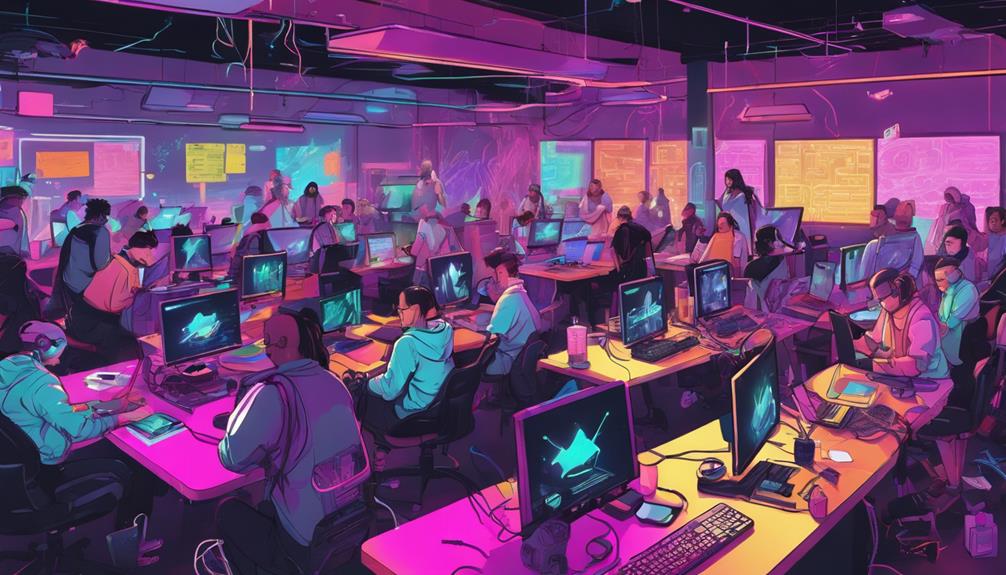Hackathons for college students offer thrilling coding competitions that foster intense collaboration on innovative projects. These events enhance problem-solving abilities, promote innovation, and build valuable networks for participants. Team formation involves aligning interests and skills, joining or creating diverse teams, and contributing individual expertise. Strategies for success include brainstorming, project planning, and effective time management techniques. Showcasing projects with strong presentation skills, engaging the audience, and interactive features are key aspects. Participants benefit from networking opportunities, mentorship, and valuable feedback from judges. Post-event reflection aids in personal growth, while future planning guarantees continued skill development.
Key Takeaways
- Hackathons promote intensive collaboration among college students.
- Participants engage in coding competitions to innovate.
- Students work on exciting projects to solve real-world problems.
- Hackathons offer a platform for applying and honing coding skills.
- College students collaborate to create innovative solutions in a competitive environment.
Benefits of Participating
Participating in hackathons offers college students a unique opportunity to enhance their problem-solving skills and foster innovation. These events provide a platform for intense collaboration, where students from diverse backgrounds come together to turn innovative ideas into reality. Through working alongside peers with different skill sets, college students can expand their network, learn new approaches to problem-solving, and develop valuable skills that are highly sought after in today's job market.
At hackathons, students are immersed in a supportive environment that encourages creativity and competition. The condensed timeframe of 24-48 hours pushes participants to think quickly, work efficiently, and focus on bringing their projects to life. This hands-on experience not only enhances technical skills but also hones soft skills such as teamwork, communication, and time management. Additionally, the networking opportunities at hackathons expose students to potential mentors, collaborators, and even job opportunities, making these events invaluable for college students looking to jumpstart their careers in innovation and technology.
Team Formation Tips

To maximize your chances of success at hackathons, consider these team formation tips based on shared interests and skill sets.
Team formation at hackathons typically involves participants pitching ideas and forming teams based on common interests and complementary abilities. Participants have the option to join existing teams or create new ones to collaborate on projects during the event.
It's essential to network and connect with others to build diverse teams that can offer a range of perspectives and expertise. Effective teams often consist of individuals with different backgrounds, such as programmers, designers, and project managers, who can contribute unique skills to the project.
Problem-Solving Strategies

Engaging in brainstorming sessions is a fundamental part of problem-solving strategies during hackathons. Here are four key strategies participants employ during coding competitions:
- Brainstorming: Teams collaborate to generate innovative ideas, leveraging diverse perspectives and skill sets to tackle complex problems efficiently.
- Designing Interfaces: Focusing on user experience, teams create intuitive interfaces that enhance usability and engagement with their projects.
- Project Plans: Developing detailed plans helps teams stay organized, allocate tasks effectively, and meet deadlines within the tight timeframe of the hackathon.
- Evaluation: Regularly appraising progress and seeking feedback from mentors or peers allows teams to refine their solutions and confirm alignment with competition criteria.
Time Management Techniques

When tackling hackathons, prioritizing tasks effectively and setting achievable deadlines are vital aspects of managing time efficiently. By clearly defining what needs to be done first and establishing realistic timelines, students can stay focused and organized throughout the event.
These techniques help guarantee that essential project components are completed promptly and contribute to a successful hackathon experience.
Prioritizing Tasks Effectively
Utilizing effective time management techniques is essential for college students participating in hackathons to prioritize tasks efficiently and maximize productivity. When prioritizing tasks effectively during a hackathon, students can follow these strategies:
- Utilize the Eisenhower Matrix: Categorize tasks based on urgency and importance to determine where to focus efforts first.
- Break Down Tasks into Sub-Tasks: Divide complex projects into smaller, achievable sub-tasks to make prioritization more manageable.
- Set Clear Deadlines and Milestones: Establish specific timelines for each task to track progress and stay on target throughout the hackathon.
- Regularly Track Progress: Continuously review priorities, adjust as needed based on progress and changing circumstances, to maintain focus and productivity.
Setting Achievable Deadlines
To effectively manage time during hackathons, college students must prioritize tasks by setting achievable deadlines. Utilizing time management techniques is essential in the intense coding competition environment. Breaking down project goals into smaller, manageable tasks with specific deadlines enhances productivity and progress. Creating a timeline with clear milestones and checkpoints aids in monitoring progress and guaranteeing timely completion of the project. By setting achievable deadlines, students not only meet project deadlines but also foster team morale through a sense of accomplishment and progress. Intensive collaboration becomes more effective when everyone is aware of their responsibilities and the time allocated for each task. This structured approach not only helps in time management but also ensures that the project moves forward smoothly. Overall, setting achievable deadlines is a key component of successful project completion in hackathons.
| Benefits of Setting Achievable Deadlines | ||
|---|---|---|
| Enhances productivity | Keeps track of progress | Boosts team morale |
Project Presentation Skills

When presenting a hackathon project, it's essential to master effective pitch techniques, utilize visual aids strategically, and engage the audience actively.
Clear communication of the problem, solution, and impact within a limited time frame is key to a successful presentation.
Incorporating visual aids, demos, and storytelling techniques can enhance the overall delivery and captivate the audience's attention.
Effective Pitch Techniques
Engaging storytelling techniques can greatly enhance the effectiveness of a project pitch, making it memorable and impactful for the audience. To deliver a compelling pitch at a hackathon event, consider the following tips:
- Clear Problem-Solution-Impact Structure:
Clearly articulate the problem your project aims to solve, your innovative solution, and the potential impact it can have. This structured approach helps the audience grasp the essence of your project quickly.
- Practice Makes Perfect:
Rehearse your pitch multiple times to guarantee fluency and confidence during the presentation. Practice in front of a mirror, with peers, or record yourself to identify areas for improvement.
- Visuals and Demos:
Incorporate visuals and demos into your pitch to enhance understanding and showcase the functionality of your project. Visual aids can make complex technological concepts more accessible to the audience.
- Feedback and Adaptability:
Be ready to answer questions and address feedback effectively. Demonstrating your knowledge and adaptability in responding to inquiries can instill confidence in your project and team.
Visual Aids Usage
Utilizing visual aids effectively enhances the clarity and impact of hackathon project presentations. Visual aids such as slides, diagrams, and prototypes play an essential role in conveying complex ideas concisely during these competitions.
By incorporating visual elements, teams can enhance understanding and engagement among judges and audience members. These aids serve as powerful tools to showcase the design, functionality, and overall impact of the projects being presented.
When used strategically, visual aids can make the presentation more dynamic, memorable, and persuasive. They complement verbal explanations by highlighting key features of the project and providing a visual representation of the concepts discussed.
In a hackathon setting, where time is limited and competition is fierce, the effective use of visual aids can make a significant difference in how well a project is received and understood by the audience.
Engaging Audience Interaction
To captivate the audience during hackathon project presentations, teams must skillfully incorporate interactive elements that draw in the judges and spectators. When it comes to engaging audience interaction and project presentation skills, the following strategies can greatly enhance audience engagement and convey innovative solutions effectively:
- Interactive Demos: Incorporating live demonstrations or interactive prototypes can offer a hands-on experience, allowing the audience to interact directly with the project.
- Q&A Sessions: Encouraging questions from the audience fosters engagement and provides an opportunity to address queries, clarify concepts, and showcase in-depth knowledge about the project.
- Storytelling: Crafting a compelling narrative around the project helps captivate the audience, making the presentation more memorable and emotionally engaging.
- Audience Participation: Involving the audience in small activities or polls related to the project can create a dynamic and inclusive presentation, fostering a sense of collaboration and interest among spectators.
Networking Opportunities

Hackathons offer college students valuable opportunities to connect with industry professionals, mentors, and potential employers through networking. At these events, participants can expand their professional network, form collaborations, and gain insights into various career paths within the tech industry. Engaging with sponsors, judges, and fellow participants provides avenues for mentorship, future partnerships, and valuable connections.
Through networking opportunities at hackathons, students can't only receive feedback on their projects but also explore potential internship or job opportunities. These interactions also help students enhance their skills, learn about new technologies, and stay updated on industry trends. Networking at hackathons goes beyond just exchanging contact information; it allows students to establish meaningful relationships that can pave the way for career growth and development.
Judges and Evaluation Criteria

During hackathons for college students, judges play an essential role in evaluating projects based on specific criteria. These judges, often industry professionals, professors, or experienced developers, assess projects with a keen eye for innovation, problem-solving skills, implementation, and overall impact.
To provide a thorough evaluation, judges typically consider factors such as creativity, technical complexity, functionality, design, and presentation. The feedback offered by judges not only determines the winners who may receive prizes, recognition, job opportunities, or mentorship but also serves as a valuable learning opportunity for all participants.
This feedback helps students understand their strengths and areas for improvement, guiding them in honing their skills and refining their projects for future hackathons. The collaborative nature of hackathons, combined with the constructive criticism from judges, fosters a culture of continuous learning and growth among college students participating in these coding competitions.
Post-Hackathon Reflection

Participants engage in post-hackathon reflection to evaluate their project outcomes, team dynamics, and personal growth. Through this reflection process, they assess the success of their project, the challenges faced during the competition, and areas where improvements can be made.
By reflecting on the Hackathon experience, participants can identify both strengths and weaknesses, as well as extract valuable lessons learned for future events. This reflection allows them to celebrate their achievements, acknowledge the contributions of team members, and set goals for upcoming challenges.
Additionally, post-Hackathon reflection plays an important role in facilitating continuous learning, skill development, and self-improvement, ensuring that participants evolve and grow with each competition they partake in.
Future Hackathon Planning

When preparing for future hackathons, college students should start by researching upcoming events to identify ones that align with their interests and goals.
Here are four essential steps to contemplate for future hackathon planning:
- Check Upcoming Hackathon Dates: Keep an eye out for announcements on upcoming hackathons like DeveloperWeek 2024, HackMIT, or Global Hack Week to plan ahead and reserve your spot.
- Explore Various Themes: Look into the themes of different hackathons to find ones that resonate with your passions, whether it's Web3 technologies, global issues, or API presentations.
- Find Suitable Venues: Take into account the locations of the hackathons and choose ones that are accessible and conducive to collaboration and innovation.
- Identify Hackathon Focuses: Understand the specific focuses of each hackathon to make sure you participate in events that align with your skills and interests, fostering personal growth and learning opportunities.
Frequently Asked Questions
Which Project Is Best for a Hackathon?
When choosing a project for a hackathon, we should align our skills and interests for maximum impact. Opt for projects solving real-world issues or with social impact potential. Collaborate with diverse teammates, prioritize innovation, and feasible ideas.
What Are Innovation Hackathons?
Innovation hackathons are events where participants collaborate intensively for 24-48 hours, turning ideas into reality. They attract tech enthusiasts, fostering creativity and innovation. These competitions offer skill development, networking, and real-world experience to college students.
What Is the Difference Between Hackathon and Competitive Programming?
The difference between hackathons and competitive programming lies in their collaborative vs. solo nature. Hackathons prioritize creativity, teamwork, and real-world applications, while competitive programming emphasizes algorithmic efficiency and problem-solving skills in an individual context.
Is Hack2skill Legit?
Absolutely, Hack2skill is legit. We've participated and can vouch for its credibility. It offers college students a chance to showcase skills, collaborate intensely on projects, and gain valuable experience in coding competitions.
Conclusion
To sum up, hackathons offer college students a unique opportunity to collaborate, innovate, and showcase their skills in a fast-paced, competitive environment.
By participating in these coding competitions, students can enhance their problem-solving abilities, time management skills, and networking connections.
With judges evaluating their projects based on specific criteria, hackathons provide a valuable learning experience for aspiring developers.
So, why not join the excitement and challenge yourself at the next hackathon?









